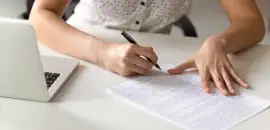

Key Takeaways
- Probate is a legal process that ensures assets are handled properly after someone's death and involves the review of the will, accounting of assets, and distribution of assets to beneficiaries.
- Probate can be avoided in certain situations, such as when assets have designated beneficiaries, when there is joint ownership with rights of survivorship, when payable on death instructions are in place, when assets are held in a trust, or when the estate is considered a small estate.
- Whether probate is necessary depends on various factors, including the specific laws of the state and the nature and value of the assets involved.
Probate is a very common legal procedure, and it's required for some assets to formally transfer from their deceased owner to his or her beneficiaries. But it can be a time-consuming and expensive process. If you wonder what probate is and when it may be avoidable, here's what to consider when estate planning.
What Is Probate & When Is It Necessary?
Probate is a legal proceeding to help ensure assets are handled properly after death. While there is no requirement for property or a will to go through probate, in some cases, it may be the only way to legally obtain ownership of certain assets.
During probate, a personal representative and local courts review the decedent's will to determine if the document is valid. They also account for assets in the estate and provide an opportunity for creditors to collect on any unpaid obligations.
Personal representative identifies beneficiaries and distributes assets according to will. In some cases, such as when there is no will, the probate process can happen so state law can dictate how the personal representative handles assets.
When Is Probate Avoidable?
There are several situations when assets may not have to go through the probate process. However, while probate may be avoidable, there is likely still a process or paperwork that's required in order to complete the transfer of the funds to the beneficiary. This isn't an all-inclusive list, but here are some examples of exceptions and what can happen if a will is not probated.
Designated Beneficiary
Assets that are properly designated to a beneficiary often bypass probate. For example, selecting a spouse as a beneficiary for an individual retirement account (IRA) or 401(k) plan generally results in the account moving to the recipient without probate. The same is typically true for life insurance proceeds when a beneficiary, whether it's a spouse or not, has been named.
Joint Property
When two or more people own property, it's possible for assets to pass to the remaining owners without probate. For example, a couple might have a bank account together or own a home as joint tenants with rights of survivorship. When one of the owners passes away, their ownership interest may automatically transfer to the remaining owner. That process is known as transferring by "operation of law." Other forms of shared ownership might work similarly, and state laws may also dictate what happens to property when someone dies.
Payable on Death
When opening financial accounts, account owners may be able to provide instructions regarding what to do when they die. For example, you may be able to add payable on death (POD) or transfer on death (TOD) instructions to your bank or brokerage accounts. When doing so, you name one or more recipients who take ownership of these assets when you die.
Assets in a Trust
Assets held in a trust may avoid the probate process. Trusts can serve a variety of purposes, including facilitating the transfer of assets after death without probate. When placing assets in a trust, the trustee becomes the owner — the person who previously owned the assets gives up ownership. When that person dies, the trust may avoid probate.
Small Estates
Even if somebody dies with assets in their own name, probate might be unnecessary if the assets are not substantial and if other factors are met.1
Is Probate Necessary for Your Family?
Several factors determine whether or not probate is required when somebody dies with assets. As you start estate planning, consider speaking with a legal expert to find out more about what probate is and what the specific laws in your state are.
Estate planning can help your family bypass probate and streamline asset transfers. Start My Free Will2
Frequently Asked Questions
What assets don't need to go through probate?
How long does probate typically take?
Can a will be executed without probate?
Why would you want to avoid probate?
Sources
- Small Estate Probate Shortcuts: Why Even Large Estates May Qualify. https://www.nolo.com/legal-encyclopedia/free-books/avoid-probate-book/chapter8-2.html.
- Free Will from Fabric by Gerber Life, a member of the Western & Southern Financial Group Family of Companies. https://www.westernsouthern.com/about/family-of-companies.


























